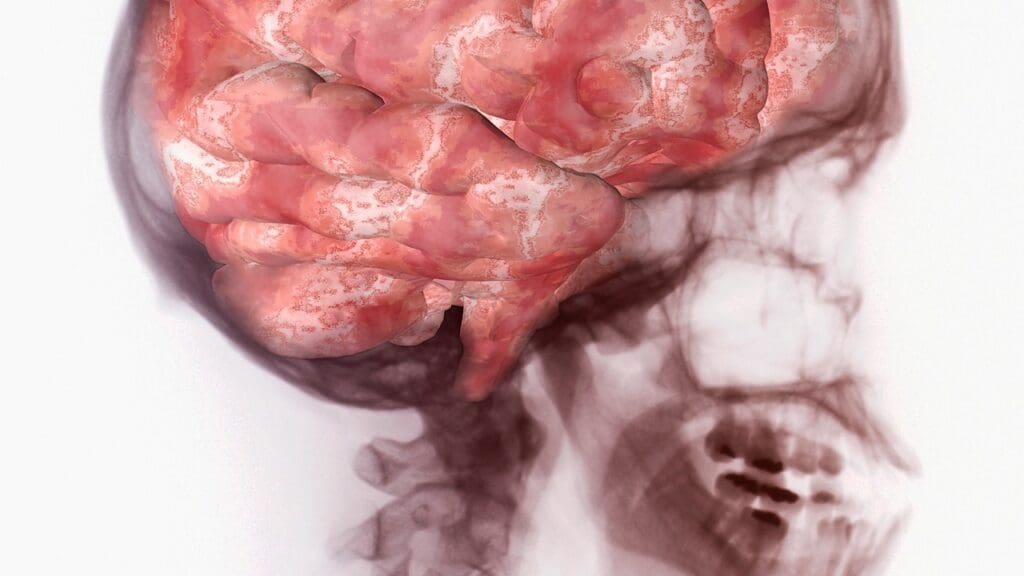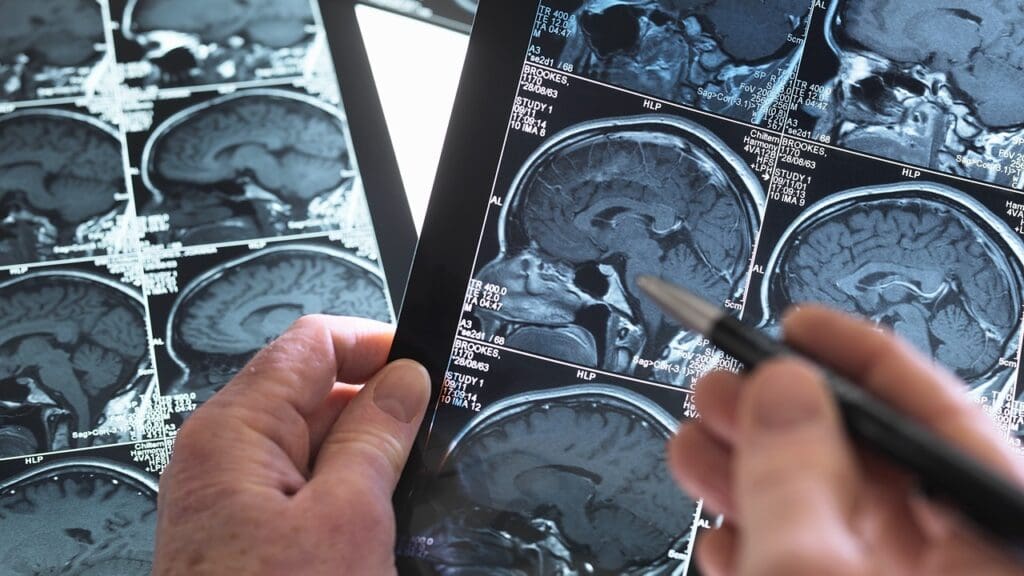
When patients are in the final stages of brain cancer, it’s tough for them and their families. We know how important it is to offer caring support during this hard time. At Liv Hospital, we’re here to help with top-notch healthcare services.
In the last stage of brain cancer, patients lose strength and brain function. They might have trouble moving, swallowing, or controlling their bladder and bowels. Breathing changes also happen. We know these symptoms are hard for everyone involved, and we aim to make their journey easier with personalized care.
Key Takeaways
- Decreased mobility is a common symptom in the final stages of brain cancer.
- Swallowing difficulties can lead to nutritional deficiencies and other complications.
- Changes in breathing patterns can be distressing for patients and their loved ones.
- Loss of bladder or bowel control requires careful management and support.
- Providing emotional support to patients and their families is critical during this time.
Understanding Brain Cancer’s Final Stage

When brain cancer reaches its final stage, patients and their families face big challenges. The tumor’s growth affects the brain a lot. This leads to many physical and mental symptoms.
Definition and Classification of End-Stage Brain Cancer
End-stage brain cancer means the tumor has grown a lot. It has spread in the brain or to other parts of the body. This stage usually means the outlook is not good.
The type of brain tumor, where it is, and how it affects the brain are key. These details help doctors understand the situation better.
Types of Brain Tumors in Terminal Phase
There are different brain tumors that can reach the end stage. Glioblastoma is one of the most aggressive types. Metastatic brain tumors start from cancers in other parts of the body.
| Type of Brain Tumor | Characteristics in Terminal Phase |
|---|---|
| Glioblastoma | Aggressive growth, significant cognitive impairment, increased sleepiness |
| Metastatic Brain Tumor | Originates from other cancers, multiple tumor sites, varied symptoms |
Knowing these details helps in caring for patients better. It also helps in providing the right support during this tough time.
Physical Decline in Brain Cancer Last Stage

When brain cancer reaches its final stage, patients often see a big drop in their physical health. This decline can show up in many ways. It affects their life quality and needs a lot of care.
Severe Fatigue and Energy Loss
Severe fatigue and energy loss are common in the final stages of brain cancer. Patients might feel very weak and struggle with everyday tasks. This weakness isn’t just physical but also mental, affecting their overall health.
It’s key to manage severe fatigue and energy loss in the final stages of brain cancer. We suggest a mix of treatments to improve life quality. This includes medicines for symptoms, physical therapy to keep moving, and counseling for mental health.
By tackling these issues, we aim to help patients face the end of brain cancer with dignity and comfort.
Neurological Symptoms in Terminal Brain Cancer
When brain cancer reaches its final stages, patients face many neurological symptoms. These symptoms can make life very hard. They include headaches, seizures, and problems with thinking and memory.
Persistent and Intensifying Headaches
Headaches are common in brain cancer patients. They get worse as the disease advances. In the final stages, these headaches can be very severe. It’s important to manage pain well to keep patients comfortable.
Pain Management Approaches
There are many ways to manage pain in terminal brain cancer. These include:
- Medications: such as corticosteroids and analgesics to reduce pain and inflammation
- Palliative care: focusing on providing relief from the symptoms and stress of a serious illness
- Alternative therapies: including relaxation techniques and acupuncture to help manage pain
| Pain Management Approach | Description | Benefits |
|---|---|---|
| Medications | Corticosteroids and analgesics | Reduces pain and inflammation |
| Palliative Care | Relief from symptoms and stress | Improves quality of life |
| Alternative Therapies | Relaxation techniques and acupuncture | Manages pain and reduces stress |
Understanding and treating these symptoms helps healthcare providers support patients better in the final stages of brain cancer.
Cognitive Changes During Final Weeks
When brain cancer reaches its final stage, patients often see big changes in their thinking. These changes can upset both the patients and their families. It’s key to understand these shifts to give the right care and support.
Memory Loss and Confusion
Memory loss and confusion are common in the final weeks of brain cancer. Patients might forget recent things, not know familiar faces, or struggle with simple tasks. This confusion gets worse as the tumor grows and the body weakens.
Disorientation and Time Awareness
Patients may also get lost in time and place. They might not know where they are or what time it is. This disorientation can make them more anxious and uncomfortable.
Studies show that patients often get very confused and lose a lot of consciousness in the final weeks. Caregivers need to create a supportive space. This helps reduce confusion and keeps the patient comfortable.
| Cognitive Change | Impact on Patient | Caregiver Support |
|---|---|---|
| Memory Loss | Difficulty recalling events or recognizing faces | Provide reminders and maintain a familiar environment |
| Confusion | Increased distress and disorientation | Minimize confusion by maintaining a calm environment |
| Disorientation | Difficulty understanding time and place | Use calendars and clocks to help maintain orientation |
Communication and Swallowing Difficulties
As brain cancer reaches its final stages, patients face big challenges with talking and swallowing. These problems can really affect their quality of life. It’s key for caregivers and healthcare teams to understand and help with these issues.
Speech Impairment Progression
Speech problems are common in the final stages of brain cancer. Patients might struggle to say words, form sentences, or even start talking. “The progression of speech impairment can be distressing for both patients and their families,” notes Dr. Jane Smith, a top neurologist. We need to offer support and find other ways for them to communicate.
Alternative Communication Methods
When talking gets hard, other ways to communicate are very helpful. These include:
- Augmentative and Alternative Communication (AAC) devices
- Picture communication symbols
- Simple gestures or eye movements
We should help patients and their families find the best ways to communicate. This ensures their needs are met during this tough time.
Swallowing problems, or dysphagia, are also common in the last stages of brain cancer. These can cause malnutrition and increase the risk of pneumonia. We must manage dysphagia well, possibly with diet changes or other treatments, to keep patients comfortable and safe.
Changes in Consciousness Levels
As brain cancer reaches its final stages, patients often see big changes in how they feel. This can be tough for both patients and their caregivers.
Increased Sleepiness and Lethargy
One common symptom in the final stages of brain cancer is feeling very sleepy and tired. Patients might sleep a lot or seem to be in a reduced consciousness state. This change is often due to the disease getting worse and can upset family members.
Distinguishing Sleep from Decreased Consciousness
Telling if a patient is just sleeping or not feeling well can be hard. Doctors use special tools to figure this out. Knowing the difference is key to giving the right care and support.
Caregivers should be aware of these changes and talk to healthcare professionals. This ensures the best care for their loved ones.
Autonomic Nervous System Dysfunction
As brain cancer reaches its final stages, patients face big challenges. The autonomic nervous system controls things like heartbeat and breathing. When it’s not working right, it can cause many problems.
Loss of Bladder and Bowel Control
One big issue in the final stages is losing control over bladder and bowel. This can cause incontinence. It’s very uncomfortable and distressing for patients.
Practical Management Strategies
Dealing with loss of bladder and bowel control needs a few steps. Here are some ways to manage it:
- Using absorbent products to manage incontinence
- Implementing a bowel management program
- Adjusting fluid intake to minimize accidents
| Symptom | Management Strategy |
|---|---|
| Urinary Incontinence | Absorbent products, timed voiding |
| Bowel Incontinence | Bowel management program, dietary adjustments |
Understanding and tackling autonomic nervous system dysfunction can make life better for patients. Good management can ease symptoms and bring comfort.
Timeline of Brain Cancer’s Final Stage
Knowing the timeline of brain cancer’s final stage is key for patients and their families. As brain cancer reaches its end stage, the focus moves from trying to cure it to making the patient comfortable. This shift focuses on improving the patient’s quality of life.
Weeks to Months Progression Pattern
The time from when brain cancer starts to decline to when it leads to death can vary. It can last from weeks to a few months. During this time, patients slowly lose strength and mental clarity.
The progression can be divided into several stages:
- Initial decline: Patients may start to feel more tired, confused, and struggle with everyday tasks.
- Rapid deterioration: As the cancer gets worse, patients may lose basic skills like eating or talking.
- Terminal phase: In the last weeks, patients often can’t get out of bed, lose a lot of weight, and may not recognize loved ones.
Individual Variation Factors
The timeline can differ a lot from person to person. This is because of various factors such as:
| Factor | Influence on Timeline |
|---|---|
| Age and overall health | Patients who are healthier may live longer. |
| Type and grade of brain cancer | More aggressive tumors, like glioblastoma, can progress faster. |
| Effectiveness of palliative care | Good symptom management can make life better and might extend the timeline. |
Understanding these factors and the typical progression can help healthcare teams and families plan better. They can prepare for the care and support needed in the final stages of brain cancer.
Glioblastoma: Specific End-of-Life Symptoms
Glioblastoma is a very aggressive brain cancer. It has unique end-of-life symptoms that doctors and families need to know. As it gets worse, patients often feel their bodies and brains getting weaker.
Unique Manifestations in Aggressive Brain Tumors
The symptoms of glioblastoma include persistent headaches, cognitive impairment, and increased sleepiness. These happen because the tumor grows fast and affects the brain around it.
Rapid Neurological Deterioration
Glioblastoma gets worse quickly, causing big problems with the brain. Symptoms include:
- Severe confusion and disorientation
- Increased frequency of seizures
- Difficulty with speech and swallowing
- Loss of motor function and coordination
These signs mean the disease is at a late stage. It needs a lot of care to help with pain and make life better for the patient.
It’s very important for doctors to know these symptoms. This way, they can give the right care and support to patients and their families.
How Brain Cancer Causes Death
It’s important for patients and their families to know how brain cancer leads to death. Brain cancer’s final stages involve complex changes that end in death.
Physiological Mechanisms of Terminal Decline
The decline in brain cancer’s final stages is due to several key changes. The main factor is the tumor’s growth. This can cause high pressure in the brain and brain herniation.
Brain Stem Compression Effects
Brain stem compression is a serious and often fatal issue in advanced brain cancer. When the tumor presses on the brain stem, it can stop vital functions. These include breathing, heart rate, and blood pressure control.
| Physiological Mechanism | Effect on the Body |
|---|---|
| Brain Stem Compression | Disrupts vital functions like breathing and heart rate |
| Increased Intracranial Pressure | Leads to brain herniation and further brain damage |
As brain cancer gets worse, patients may face many symptoms. Knowing these changes helps in giving the right care at the end.
Palliative Care Approaches for Terminal Brain Cancer
Palliative care is key for improving life quality for those with terminal brain cancer. As the disease gets worse, managing symptoms is more critical. This ensures patients stay comfortable and maintain their dignity.
Symptom Management Strategies
Managing symptoms well is essential for patients with terminal brain cancer. This requires a mix of treatments, including medicines and non-medical methods.
Medication and Non-Pharmacological Interventions
Medicines are vital for controlling pain, seizures, and other symptoms of brain cancer. Non-medical treatments like physical therapy, counseling, and relaxation techniques also play a big role. They help reduce stress and improve life quality.
Healthcare teams use these methods together to give full care to patients with terminal brain cancer. The aim is to offer comfort, lessen suffering, and support patients and their families during this tough time.
Conclusion: Navigating the End-of-Life Journey with Brain Cancer
Dealing with the end stages of brain cancer needs kindness, understanding, and the right care. It’s key to know the signs and symptoms of brain cancer’s final stages. This helps in supporting patients and their families.
In the final stages, patients may lose strength and mental sharpness, leading to death from brain tumors. Spotting the signs of death can help families prepare and find support.
We’ve talked about the symptoms of brain cancer’s final stages. These include extreme tiredness, neurological issues, and changes in thinking. Knowing these symptoms helps caregivers support patients better, whether they’ve passed away or are close to it.
Palliative care is very important in managing symptoms and improving life quality for those with terminal brain cancer. It focuses on supportive care, helping patients and families face this tough time with dignity and kindness.
What are the common symptoms of brain cancer in the final stages?
Symptoms include loss of mobility and swallowing issues. Changes in consciousness and severe fatigue are also common. Neurological symptoms like headaches and seizures can occur. Cognitive changes and autonomic nervous system dysfunction are also seen.
How does brain cancer affect cognitive function in the final stages?
Brain cancer can lead to memory loss, confusion, and disorientation. It’s important to provide care and support to patients and their families.
What is the role of palliative care in managing terminal brain cancer?
Palliative care focuses on managing symptoms and improving comfort. It’s vital for addressing the physical and emotional needs of patients with terminal brain cancer.
How does glioblastoma differ from other types of brain cancer in its final stages?
Glioblastoma is aggressive and causes rapid neurological deterioration. It has unique end-of-life symptoms and a distinct progression pattern.
What are the physiological mechanisms that lead to death in brain cancer patients?
Brain cancer can cause death through brain stem compression. This can lead to respiratory failure, cardiac arrest, and other complications.
How can communication difficulties be addressed in brain cancer patients?
Augmentative and alternative communication (AAC) devices can help. They support patients with speech impairment, ensuring their needs are met.
What is the typical timeline for the final stage of brain cancer?
The timeline varies from patient to patient. Understanding the progression pattern and factors that influence it can help in planning care.
How can autonomic nervous system dysfunction be managed in brain cancer patients?
Practical strategies like catheterization for urinary retention can be used. Bowel management programs can also help, improving patient care and comfort.
What are the key aspects of care for brain cancer patients in the final stages?
Providing complete care is essential. This includes managing symptoms, emotional support, and addressing physical needs. It improves the quality of life for patients and their families.
How can families and caregivers support loved ones with brain cancer in the final stages?
Emotional support and help with daily activities are important. Ensuring patients receive appropriate medical care also makes a big difference in their quality of life.
What are the signs that indicate the end-of-life stage in brain cancer patients?
Signs include significant changes in consciousness and increased sleepiness. Loss of mobility and other symptoms also indicate the final stages.
How does brain cancer impact the quality of life for patients and their families?
Brain cancer can cause physical, emotional, and cognitive challenges. It’s important to provide complete care and support to improve their quality of life.
References
- The Brain Tumour Charity (What Happens at the End of Life) : https://www.thebraintumourcharity.org/living-with-a-brain-tumour/end-of-life-bereavement/what-happens-end-life
- Glioblastoma Support (End State Symptoms of Brain Tumor Patients) : https://glioblastomasupport.org/end-of-life-resources/end-state-symptoms-of-brain-tumor-patients
- Moffitt Cancer Center (What Are the Symptoms of End-Stage Brain Cancer) : https://www.moffitt.org/cancers/brain-cancer/faqs/what-are-the-symptoms-of-end-stage-brain-cancer
- Aaron Cohen-Gadol, MD (Glioma Survival/End-of-Life) : https://www.aaroncohen-gadol.com/en/patients/glioma/survival/end-of-life
- Ezra (Recognizing the Symptoms of Terminal Brain Cancer) : https://ezra.com/blog/recognizing-the-symptoms-of-terminal-brain-cancer


































